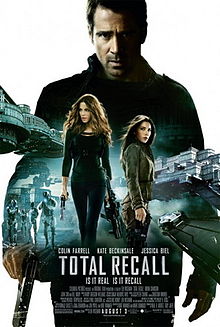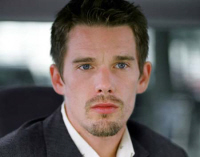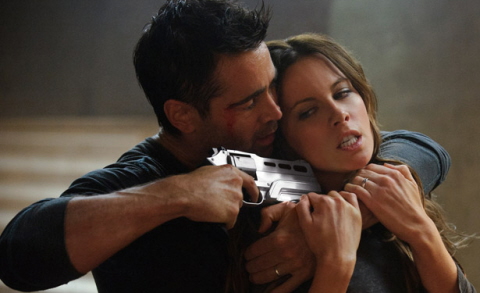The following dives into the plot of the new Total Recall. If you haven’t seen the film and do not want it spoiled, feel free to come back at your earliest convenience. And be sure to check out our review.
 With Len Wiseman’s Total Recall remake now safely behind us, I wanted to take a closer look at something I noticed about the final product. More interesting than anything that’s in the film, is something that was shot and didn’t make it – a fairly major plot twist. It’s a twist that actually makes a great deal of sense in the context of the film, and a complexity that might have helped distance it from its vastly superior predecessor.
With Len Wiseman’s Total Recall remake now safely behind us, I wanted to take a closer look at something I noticed about the final product. More interesting than anything that’s in the film, is something that was shot and didn’t make it – a fairly major plot twist. It’s a twist that actually makes a great deal of sense in the context of the film, and a complexity that might have helped distance it from its vastly superior predecessor.
After watching Recall, I couldn’t help thinking back to Josh’s spoiler-intense piece from June. In it, Josh reveals that the Douglas Quaid / Hauser that’s been played by Colin Farrell up to this point, began life looking a whole lot like Ethan Hawke. The crux of the twist was that it wasn’t only Quaid’s mind that was scrambled, but his face had been changed to further disassociate from his past life as Hauser. Except Hawke never shows up in the finished film, with all the Hauser scenes now absorbed by Farrell.
The twist makes sense given Hauser is the most-wanted man on Earth – being mentioned on the news. So if the Euroamerican and New Shanghai special forces of 2084 are supposedly looking him, how is it that no one has ever seen his face? At no point in the film do bystanders ever say “Holy shit, you look a lot like that terrorist everyone is hunting.”
 Everything about this omission feels like somebody, be it Wiseman, Sony, ect., got cold feet. The setup is certainly still in the film, as logic would dictate that media and government would have worked to plaster Hauser’s face everywhere. Unless of course the government were in on it and trying to keep Hauser’s mindwipe a secret (which we find out, they are), but even that’s flimsy given the fact that Hauser is firmly established in this world as a terrorist and a spy for the underground rebellion. People, especially sympathizers, would recognize an un-doctored Hauser.
Everything about this omission feels like somebody, be it Wiseman, Sony, ect., got cold feet. The setup is certainly still in the film, as logic would dictate that media and government would have worked to plaster Hauser’s face everywhere. Unless of course the government were in on it and trying to keep Hauser’s mindwipe a secret (which we find out, they are), but even that’s flimsy given the fact that Hauser is firmly established in this world as a terrorist and a spy for the underground rebellion. People, especially sympathizers, would recognize an un-doctored Hauser.
Would keeping the twist in have made for a better film? It would have made for a more thought-provoking one. Philip K. Dick’s short We Can Remember It For You Wholesale (of which this film is based) is all about identity and discovering a self we never knew existed. Unlike the 1990 film, where Quaid finds himself at odds with Hauser’s ideologies, the Hauser in this new film turns out to be a pretty decent guy as well – going so far as to turn coat and aid the rebellion. Having Quaid’s face restructured would have added a complexity in a film sorely lacking. It could have also raised questions as to who this Quaid really was and which memories were the real implants. Something, anything to keep the audience engaged beyond the mundane action piece taking up theatre space.
So why did Hawke’s scenes end up on the cutting room floor? Columbia/Sony is tight-lipped (Update: Wiseman now claims Hawke was cut “for pacing”). I’d imagine it had everything to do with underestimating the audience’s ability to put the pieces together. Like I mentioned above, Total Recall ’12 is a wholeheartedly straight-forward action flick lacking any of the original’s subtlety or nuance. Keeping Ethan Hawke’s alterna-Hauser in the picture means complicating this actioner even further.

It’d be reasonable to intimate Hawke’s scenes are tonally or structurally out of whack with the final film – that they simply didn’t work and the studio was forced to move in a different direction. Still, it’s hard to believe a studio would leave a twist like this on the table. It’s an ace-in-the-whole that could have kept the conversation going beyond opening weekend. In that regard it’s reminiscent of the changes Warner Bros. made to the ending reveal of Terminator: Salvation (Skynet as humanity’s savior), the difference being those twists never made it to the shooting phase.
Len Wiseman’s Total Recall remake is a film content with its own simplicity. And while the machinations for a big twist are certainly present in the film, it never arrives. We can only speculate as to whether what ended up on screen is the best version of the film, or if lack of faith in their audience caused a studio to get cold feet.